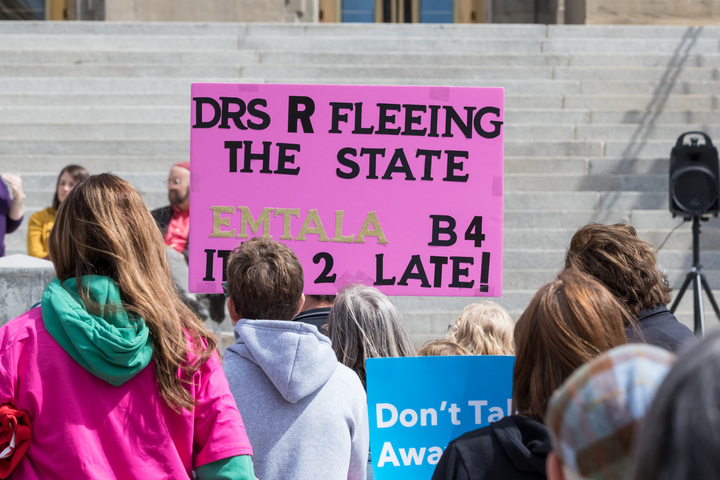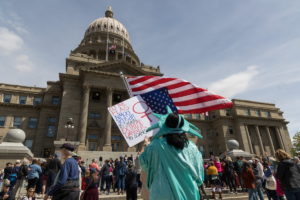U.S. Supreme Court urged to protect emergency room abortion care ahead of arguments

At a Planned Parenthood Great Northwest rally on Sunday, April 21, Idahoans advocated for the U.S. Supreme Court to rule that federal law protects access to abortion procedures in emergency situations, even in states like Idaho with strict abortion bans. (Otto Kitsinger/Idaho Capital Sun)
A doctor in Idaho recently saw a pregnant patient whose water broke at 15 weeks of pregnancy — something that normally happens at 38 weeks or later.
It was about eight weeks before the fetus could be delivered and survive, even with medical intervention. Amniotic fluid, released when the water breaks, is critical to fetal development, and under such circumstances is quickly prone to infection.
Another hospital had already turned the patient away because of Idaho’s abortion ban, and the patient couldn’t travel out of state for financial and insurance-related reasons. The closest hospital was a six-hour drive through remote country roads with spotty cell service. Staying put was safer than potentially delivering the fetus in the car and risking hemorrhage.
The patient’s condition eventually deteriorated to a serious infection called chorioamnionitis, which the doctor tried to treat but it did not improve. When it had advanced far enough, the doctor felt safe to end the pregnancy, but said it was a traumatic experience for the patient and torture for the doctor, who thought she had violated her medical ethics by delaying care because of fear of prosecution by the state.
An attendee at a rally hosted by Planned Parenthood Great Northwest on Sunday, April 21, ahead of oral arguments in the U.S. Supreme Court case on Wednesday morning. (Otto Kitsinger/Idaho Capital Sun)
That story was included in an amicus brief submitted by the Idaho Coalition for Safe Healthcare, a group of 678 physicians and providers who urged the U.S. Supreme Court to protect emergency abortion care from the criminal penalties of the state’s near-total abortion ban. The ban contains an exception to save a pregnant patient’s life, but not to preserve health.
Justices will hear oral arguments Wednesday morning, and the outcome will determine the future of emergency room medical care for certain obstetric complications, particularly in states with similar restrictions. Without the protection of federal law, doctors who may need to terminate a pregnancy to stabilize a patient in a health emergency will have to continue to transfer patients out of state or risk jail time and the loss of their medical license under the ban. Since January, when the court lifted an injunction that protected emergency room abortions in Idaho, the number of air transfers at one of Idaho’s largest hospitals for pregnancy-related complications has increased from one in 2023 to six in four months.
Idaho’s abortion ban took effect in August 2022, a few months after the nation’s highest court issued its Dobbs v. Jackson Women’s Health Organization decision that overturned Roe v. Wade, ending federal protection for abortion access and returning oversight to the states. The U.S. Department of Justice sued Idaho that same year over the ban, saying it violated the Emergency Medical Treatment and Labor Act, or EMTALA, which mandates that Medicare-funded hospitals provide stabilizing care for patients who come to an emergency room regardless of their ability to pay. Former President Ronald Reagan signed EMTALA into law in 1986 in an effort to prevent “patient dumping,” when hospitals would often turn patients away because their insurance provider was Medicaid.
A pregnant patient might come to the ER for various reasons, including high blood pressure, bleeding, or when their water breaks prematurely.
Without the ban in place, a doctor would likely recommend termination of the pregnancy to avoid further complications. But with the ban, rather than wait for a patient’s condition to deteriorate and to avoid the risk of being prosecuted, doctors are choosing to send people to out-of-state clinics with more access to abortion under the law, including Utah, Washington and Oregon.
The brief also noted that several coalition doctors are advising their patients who are or are trying to get pregnant to purchase a membership with an air transport service such as Life Flight or Air St. Luke’s for the duration of their pregnancies.
“In short, these doctors are preparing to do exactly what EMTALA forbids: transfer their patients with emergency medical conditions that threaten their health, their bodily functions, or their fertility — but not clearly their life — to out-of-state hospitals to receive the emergency stabilizing care they desperately need,” the brief said.
Alliance Defending Freedom attorneys: EMTALA would allow abortion for any stated ‘emergency’
The Department of Justice argues that termination is the appropriate stabilizing care in some situations to comply with the EMTALA law, which states that an individual has an emergency medical condition that could place the health of the woman or her fetus in serious jeopardy, or could seriously impair bodily functions without immediate attention.
The government says since the act only applies when an emergency condition seriously threatens a person’s health, it would still be a rare occurrence.
“That means, for example, that if complications occur later in pregnancy and the fetus can be delivered safely, there is no conflict between EMTALA and Idaho law,” the brief says.
Idaho is represented by Alliance Defending Freedom, a religious conservative law firm that argued Dobbs and an abortion medication case before the court. Since the court decided to take the case in January, dozens of interest group organizations have filed amicus briefs to support or oppose it, along with doctors, patients and attorneys representing Idaho’s largest health system, St. Luke’s.
Attorneys for the Alliance say EMTALA imposes no federal standard of care, “much less a standard that conflicts with state abortion law.” The brief goes on to say Idaho’s law provides an exception to save the patient’s life, but also says a treatment that is unavailable by state law cannot be provided for any reason.
“If state law allows a doctor to provide a particular treatment, then that service is available at a hospital for EMTALA purposes. But if state law prohibits a particular treatment, then the facility cannot provide it to anyone, no matter the circumstances,” the brief reads.
The attorneys also argue that if emergency room situations are left to a doctors’ subjective “medical judgment,” then EMTALA would not only be limited to the “truly life-threatening scenarios the government highlights, or even to abortion.” Doctors, they say, would become “essentially unregulated” with their own judgment superseding all state laws regulating the practice of medicine.
The U.S. Department of Justice sued the state of Idaho in 2022 over its near-total abortion ban, arguing it was in conflict with a federal law known as the Emergency Medical Treatment and Active Labor Act, or EMTALA, because it did not provide exceptions for abortion care that may be needed in emergency situations. The case included Idaho Attorney General Raúl Labrador and the Idaho Legislature as defendants. In November, Labrador chose Alliance Defending Freedom, a religious conservative law firm that has argued multiple anti-abortion cases before the court, to represent Idaho in the case, with support from another law firm aligned with conservative causes called Cooper & Kirk. Attorneys for ADF will argue on Idaho’s behalf before the U.S. Supreme Court on Wednesday morning. (Created with LittleSis)
However, Idaho’s exception to save a pregnant patient’s life uses the language that the abortion was performed in a doctor’s “good faith medical judgment and based on the facts known to the physician at the time.”
An example the ADF attorneys give is the idea that EMTALA protections would allow a doctor to subjectively determine that an abortion is required to stabilize an “emergency” mental health condition, such as severe anxiety or depression.
In response, the Department of Justice said the ADF attorneys did not identify a single case where an emergency room physician terminated a pregnancy to stabilize a mental health condition or cite any clinical standard identifying termination as necessary stabilizing care in such circumstances.
Christine Myron, spokesperson for St. Luke’s, said while a psychiatric condition where someone is expressing suicidal thoughts is considered an emergency medical condition requiring stabilizing treatment, that treatment would be to make sure the patient is “protected and prevented from injuring or harming themselves or others,” whether pregnant or not. That may include transferring the patient to a psychiatric hospital.
“Alternatively, a pregnant patient with a psychiatric emergency may be admitted for both psychiatric care and obstetrical care, if available at that hospital. Pregnancy termination is not the standard of care to stabilize a mental health emergency,” Myron said.
The same arguments have been made at the state level in Idaho and other states with bans to prevent legislation from moving forward that would allow a physician to terminate a pregnancy to preserve a patient’s health, not just prevent death. Legislators in those four states, such as Arkansas, said a health exception would allow anyone to make a claim that somehow their health was being affected by a pregnancy and they could find a doctor to support the decision.
The post U.S. Supreme Court urged to protect emergency room abortion care ahead of arguments appeared first on Idaho Capital Sun.



